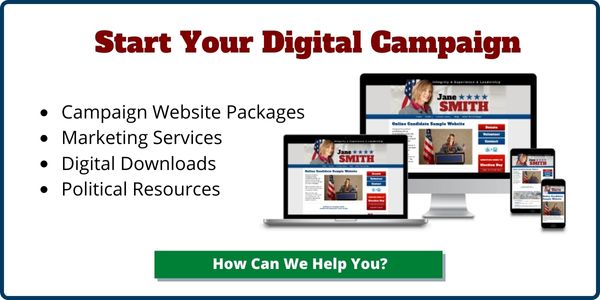Not long ago, local candidates asked, “Do I really need a campaign website?” Today, the better question is, “When should I launch one?”
When we started Online Candidate, potential clients would sometimes ask, “Tell me why I need a website.” Back in the early 2000s, that was a legitimate question. Presidential candidates had been online since the 1990s, but local campaigning was still a few election cycles behind. There were not many political candidates who had websites.
It was also difficult to raise money online. Fewer people were comfortable donating online. Setting up donation options was also fairly difficult, which often required custom programming to gather proper donor information.
Since then, digital campaigning has become a must. Local candidates now use websites to raise money, share their message, and connect with voters. Whether you’re running for town council or county judge, having a central online hub is no longer optional, it’s essential.
While you can run a political campaign today without a dedicated website, it’s not easy. A campaign website offers numerous advantages and can significantly enhance your chances of success.
With that in mind, here are six reasons why every candidate today needs a political website:
1. To establish an online presence
Today, voters turn to the internet for information about political candidates. A website serves as a central hub. It’s where voters can learn about your background, values, and policy positions. It allows you to present a professional image and showcase your candidacy in a positive way.
It’s also the only digital platform you fully control—unlike social media, where algorithms change and accounts can be suspended.
Free Digital Campaigning Tips: Subscribe for free guides and updates from Online Candidate.
2. It enhances your fundraising and volunteer recruitment
Do donors still write checks anymore? A website provides a great platform for online fundraising. It makes it easy for supporters to donate to your campaign. Even if you are running for a local council position or school board, accepting online donations makes raising money much easier. Most donation platforms are free to set up and only take a fee from the donations you raise.
If you want supporters to volunteer, set up a page to provide information about how they can get involved. Make sure you follow up with them right away to put them to work!
Modern campaign platforms also allow you to track and segment donors and volunteers for better follow-up and outreach.
Related: Comparing Political Donation Platforms: Our Recommendations
3. It allows direct communication with constituents
A website provides a direct and effective channel for communication with voters. You can share your message, address key issues, and outline your plans and initiatives in detail. By including contact forms or email addresses, constituents can easily reach out with questions, concerns, or requests, fostering a two-way dialogue. It’s also a more trusted channel for voters who want to learn more but prefer not to use social media.
4. A website increases your visibility and reach
By making your website search engine friendly, you can improve your online visibility and attract more visitors. When potential voters search for information about you or your campaign, having a site with relevant content can help you appear in search results. This free online exposure expands your reach beyond traditional campaign channels.
You may be thinking, “Why not just have a campaign Facebook page and leave it at that?” While platforms like Facebook, X/Twitter, and Instagram reach a broad audience, they don’t reach everyone. Not all voters are on social media. Some individuals, particularly older demographics or those who prefer more privacy, may not have social media accounts.
Search engines index websites—not social posts. A well-built website helps voters find you when they’re searching for your name, your office, or local election information.
5. Share news and updates in a central location
Keeping voters informed about campaign news, events, and developments helps maintain interest and engagement. A website allows you to publish regular updates, press releases, and blog posts. This helps you build trust and credibility with voters.
You can also use your site to highlight endorsements, promote fundraising events, or share post-election results and thank-you messages.
6. The costs are minimal
Setting up a website through a service like Online Candidate is fairly inexpensive. While you can hire expensive web developers and designers for a more customized experience, we provide both. Our website builder allows users to create their own political website quickly and easily. Or we can build it out for you at a fraction of the cost of a custom web designer.
Actually, a campaign website is probably the least expensive purchase your campaign will make. Consider the cost of signs, mailers, and traditional and online advertising (which isn’t as inexpensive as you may think). You’ll see that the up-front cost of starting a website is minimal.
A campaign website also lasts through the entire election cycle, working 24/7 to share your message and generate support.
Bonus: Control the narrative
If you do not put information about yourself online, then someone will. As a candidate, you’ll want to control your message. To do that, you need a digital presence and a positive online reputation.
Launching early also helps search engines index your content, giving you a better chance of ranking before voters start looking you up.
« How Does Running for Office Differ in a Major City Versus a Small Town?Maximizing the Impact: Best Practices for Online Donations »







